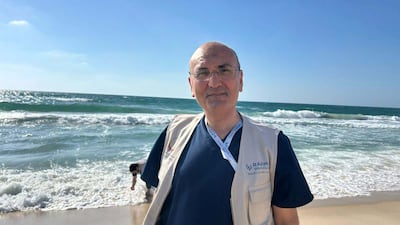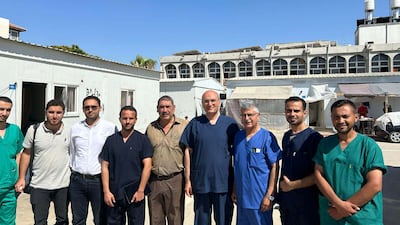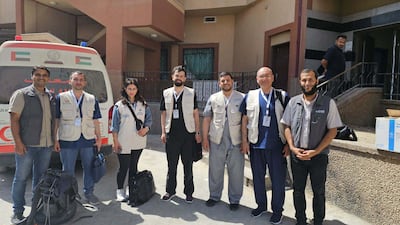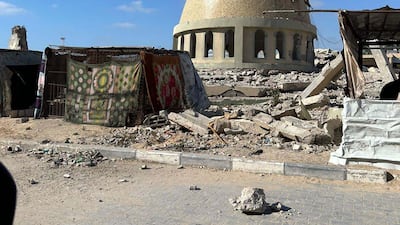Live updates: Follow the latest news on Israel-Gaza
A consultant neurosurgeon who answered the call to support Gaza's decimated health sector has described how hero medics in the war-torn enclave are delivering life-saving care amid chronic supply shortages and the persistent threat of Israeli air strikes.
Dr Maher Elayyan, a former head of the brain and neurosurgery unit at Jordan's King Hussein Cancer Centre, said he had to resort to using hand saws and manual drills to perform delicate brain surgeries at hospitals left “in ruins” from heavy bombardment.
Dr Elayyan, 51, who operates his own private clinic in Amman, volunteered to lend a crucial helping hand under a humanitarian mission organised by a US charity.
Doctors from countries such as Jordan, Egypt, Algeria, Pakistan and the US offered their expertise on the Gaza trip in June.
“My entire family was not only supportive of my decision but encouraged it,” Dr Elayyan told The National, who is now back in Jordan.
“Some of my children, despite their young age, wanted to accompany me, but that was not possible.”
The team was made up of 16 doctors specialising in anaesthesia, gynaecology, emergency medicine, orthopaedics, and urology, among others, who travelled at their own expense.
“This is the least we can do for our people in Gaza, and yet, we remain inadequate in our support,” said Dr Elayyan.
Hospitals on verge of collapse
The doctors worked at both the Al Nasser medical complex and the European Hospital in Gaza, witnessing first hand the devastation caused by a war now in its 10th month.
“Both hospitals were in ruins,” said Dr Elayyan.
“Al Nasser medical complex, after Israeli raids, was undergoing some rehabilitation, yet the medical staff continued providing services, including neurosurgery, despite the lack of materials.”

Dr Elayyan carried out 11 brain tumour surgeries with only the most basic of medical instruments at his disposal.
“We opened skulls using a manual drill and cut bones with hand saws,” he said.
He said the European Hospital was in slightly better condition but still lacked many essential supplies.
The limited materials and continued bombings severely restricted the number of surgeries.
“A four-month-old girl required surgery for a cranial deformity before she completed a year of age,” he said.
“I managed to close the skull joints causing pressure on her brain, and she improved and was discharged.”
Dr Elayyan recalled the challenging case of a two-and-a-half-year-old girl with a brain tumour that affected her ability to stand and swallow.
“The surgery was successful, and she showed signs of improvement, but she urgently needs further treatment outside Gaza,” he said.
“Without continued treatment, the tumour is likely to return.”
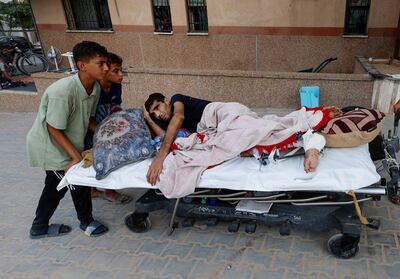
Another case involved a 54-year-old woman with a skull base tumour that had caused her to lose the ability to raise her left arm.
“Despite the complexity, the surgery was successful, and she improved without complications.”
All surgeries were performed without MRI scans, which he said was a basic requirement for anatomical study before surgery.
“MRI machines are unavailable throughout Gaza. We had to rely on CT scans instead,” he said.
Supply shortages were so severe that some operations were even delayed as gauze was unavailable.
Dr Elayyan commended Gaza's surgeons for carrying out complex surgeries in a war zone.
“Their knowledge and skills in handling cases like brain haemorrhages and injuries are impressive,” he said.
“Their need for help now is in materials, from gauze to major equipment and anaesthesia supplies, and nursing staff.”
Patients on ventilators evacuated
On his final day on duty, Dr Elayyan witnessed patients, some on ventilators, being forced to evacuate European Hospital under the threat of bombing.
“Messages were sent to everyone's mobile phones, giving them 24 hours to evacuate,” he said.
He said the hospital came under attack as soon as the evacuation was completed.
Dr Elayyan urged people to do everything in the power to help those suffering in Gaza.
“I urge anyone capable of helping to do so. The people of Gaza need actions, not words or Facebook posts,” he said.
“I want to return, and I'm not alone wishing to do so, everyone who has been there wants to go back and help as much as possible.”
He offered guidance to medical graduates who were prepared to overcome huge adversity in order to have the opportunity to help the needy.
Dr Elayyan said he and other doctors supervised exams for neurosurgery residents facing the sternest of tests.
“One candidate came without any sleep because his family's tent was bombed, and he spent the night securing them in another tent,” he said.
“Many graduated and others passed their exams and advanced to the next year.
“Despite the indescribable harsh conditions, these doctors are dedicated to learning and development.”
“Professionally, they are ready and capable with their excellent knowledge to practice their work.”
